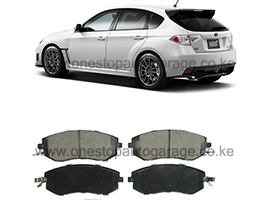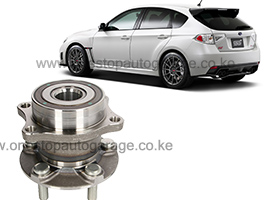-21%
Find the best Prices for genuine Front Hub-Bearing Subaru Impreza in Nairobi, Kenya
Hub bearings, also known as wheel bearings, play a crucial role in the proper functioning of a car’s wheels. These bearings are located within the wheel hub assembly and facilitate smooth rotation of the wheels. The primary functions of hub bearings in a car include:
- Load Support: Hub bearings support the weight of the vehicle and distribute it evenly across the axles. This helps in maintaining proper alignment and balance, ensuring smooth and stable driving conditions.
- Axial and Radial Load Handling: Hub bearings are designed to handle both axial and radial loads. Axial loads act parallel to the axis of rotation (sideways), while radial loads act perpendicular to the axis (vertically). The bearings must effectively manage these forces to provide optimal performance.
- Reducing Friction: Hub bearings reduce friction between the wheel and the axle, allowing the wheel to rotate freely with minimal resistance. This is essential for efficient fuel consumption and overall vehicle performance.
- Wheel Rotation: Hub bearings enable the wheels to rotate at different speeds, accommodating the vehicle’s turns and ensuring smooth maneuverability. This is particularly important in steering and cornering.
- Noise Reduction: Properly functioning hub bearings contribute to a quiet and smooth ride. They help minimize noise generated by the rotation of the wheels, creating a more comfortable driving experience.
Signs of Worn Out Hub Bearings:
Over time, hub bearings can wear out due to factors like regular use, exposure to harsh road conditions, and lack of proper maintenance. Recognizing the signs of worn-out hub bearings is crucial to address the issue before it leads to more significant problems. Here are some indicators that your hub bearings may be worn out:
- Unusual Noises: One of the most common signs of worn-out hub bearings is the presence of unusual noises. If you hear a constant humming, grinding, or rumbling sound, especially when driving at a consistent speed or during turns, it could indicate deteriorating hub bearings.
- Vibration in the Steering Wheel: Worn-out hub bearings can cause vibrations in the steering wheel. If you feel an unusual vibration while driving, especially at higher speeds, it may be a sign that the hub bearings are not providing smooth rotation.
- Uneven Tire Wear: Inspect your tires regularly for signs of uneven wear. Worn-out hub bearings can lead to uneven tire tread patterns, as the wheels may not be rotating uniformly.
- Looseness or Play in the Wheel: A worn-out hub bearing can result in play or looseness in the wheel. If you notice excessive movement or wobbling when you try to shake the wheel, it could be an indication that the hub bearings are compromised.
- ABS Warning Light: Some modern vehicles are equipped with anti-lock braking systems (ABS) that rely on sensors near the hub assembly. If the hub bearings are worn out, it may trigger the ABS warning light on the dashboard.
- Excessive Heat: Touch the hub assembly after driving for a while. If it feels excessively hot, it may suggest that the hub bearings are generating excessive friction, leading to heat buildup.
Physically inspecting the wheel hub for signs of damage, rust, or play.
Conclusion:
Regular inspection and maintenance are essential to ensure the proper functioning of hub bearings. If you observe any of the signs mentioned above, it’s advisable to have a professional mechanic inspect and replace the worn-out hub bearings promptly. Ignoring these signs can lead to more severe issues, affecting the vehicle’s safety and performance. Regular maintenance, including lubrication and proper wheel alignment, can contribute to extending the lifespan of hub bearings and promoting a smooth driving experience.



